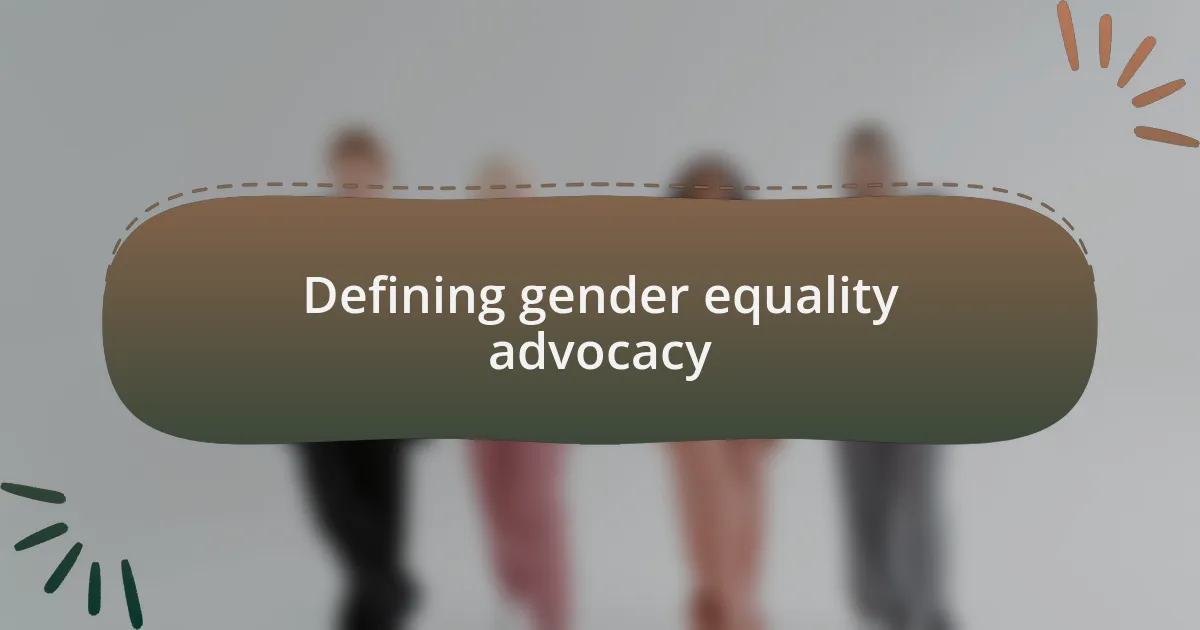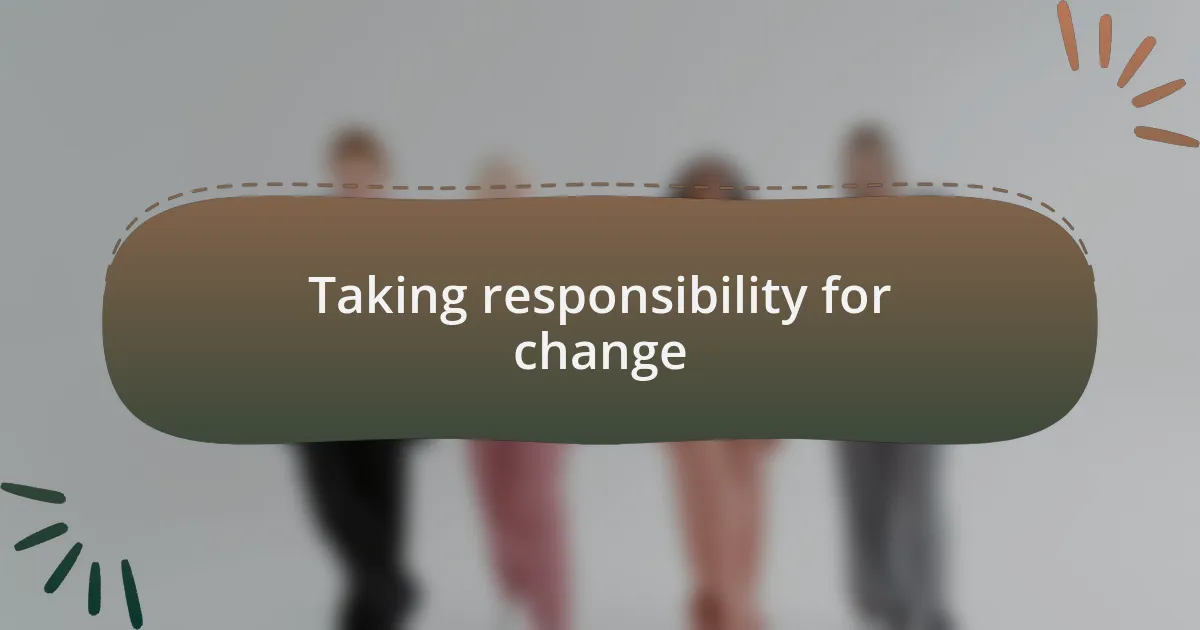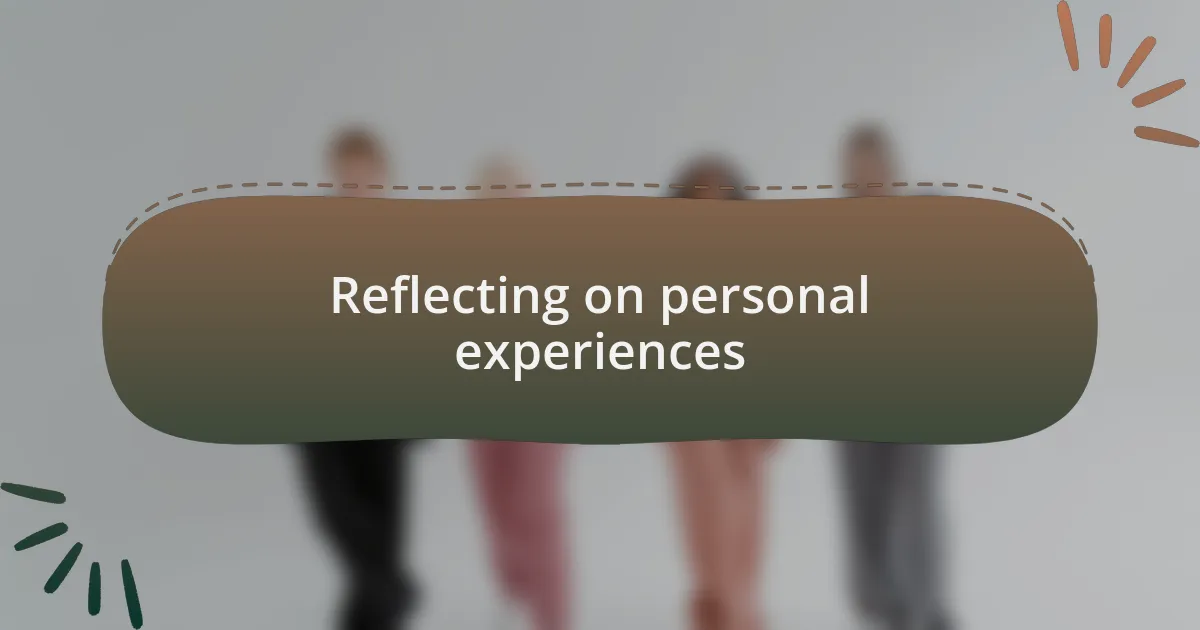Key takeaways:
- Privilege can be invisible; recognizing it is essential for fostering empathy and understanding others’ struggles.
- Gender equality advocacy is about challenging systemic barriers and empowering all voices, demanding active participation from everyone.
- Taking responsibility for change involves listening to marginalized voices, amplifying their experiences, and committing to continuous learning and action.
- Practical advocacy steps include volunteering, facilitating educational discussions, and mobilizing community resources to create impactful change.

Understanding privilege in society
Privilege is often invisible to those who possess it, which can be a difficult pill to swallow. I remember a moment when I was having a conversation with a friend who faced barriers I had never considered. It struck me how my access to education and resources simply wasn’t an option for her, and it made me question: How often do we take our advantages for granted?
Reflecting on my experiences, I’ve realized that privilege doesn’t just exist in material wealth; it permeates our social interactions and opportunities. For instance, when I attend professional gatherings, the ease with which I engage in conversations about my work stems from a subconscious confidence shaped by a background of support and encouragement. This made me ponder how many voices go unheard simply because they haven’t had the same foundational support that I’ve benefited from.
Understanding privilege invites us to unpack the layers of societal advantages, both overt and subtle, that shape our experiences and perceptions. If you’ve ever felt a sense of unease stepping into a new space, whether it’s a job interview or a social event, consider what might have made that space more welcoming for someone else. Perhaps acknowledging these disparities can inspire us to foster environments where everyone feels included and valued.

Defining gender equality advocacy
Gender equality advocacy is about actively promoting equal rights and opportunities for all genders. This means recognizing the entrenched systems of discrimination that affect individuals differently. I remember attending a workshop on gender bias where we explored real-life scenarios; it was eye-opening to see how deeply rooted these biases are in workplaces and educational institutions.
The essence of gender equality advocacy lies in challenging these systemic barriers and fighting for changes that empower everyone, regardless of gender. I think back to the times when my voice felt drowned out in a conversation dominated by louder opinions. It made me realize how vital it is to create spaces where all voices are amplified and respected. Don’t you find it disheartening when talented individuals don’t get a chance to shine simply because of gender stereotypes?
Ultimately, this advocacy extends beyond mere awareness; it demands action and responsibility from all of us to create meaningful change. I often reflect on my role in these conversations and wonder how I can contribute to dismantling stereotypes. Can we all commit to being advocates in our own circles? Each small effort can spark a ripple effect toward a more equitable society.

Recognizing personal privileges
When I take a moment to reflect on my own privileges, I often feel a mix of gratitude and responsibility. For instance, having access to education and the freedom to express my thoughts openly has shaped my worldview. How many people, I wonder, are silenced by circumstances beyond their control, making it vital for those of us who can speak up to do so with intention?
Recognizing personal privilege allows us to see the unfair advantages we hold in society. I remember a conversation with a friend who shared her struggles with being a single mother; it hit me hard. It illustrated how my privilege—having a support system and financial stability—could create an unintended gap in understanding the challenges others face. Are we aware of the barriers that keep marginalized voices from being heard?
It’s crucial to acknowledge that privilege isn’t just about wealth or status; it encompasses various aspects of identity, including gender, race, and ability. In my experience, acknowledging these factors has opened my eyes to the complexities of our social fabric. Have you ever considered how these layers influence our interactions with others? Embracing this understanding not only enhances our empathy but also propels us to act in ways that dismantle inequities in our communities.

Taking responsibility for change
Taking responsibility for change means actively participating in the dialogue and actions that promote equity. I recall a workshop I attended where participants shared their stories of struggle and resilience. It struck me how powerful it is to listen to others’ experiences, compelling me to leverage my own voice for advocacy. I ask myself, how can I effectively use my platform to create space for those who are often overlooked?
Responsibility isn’t just a personal journey; it’s a collective one. I once joined a local initiative focused on racial equality and found that my role as an ally was to amplify marginalized voices rather than substitute my perspective for theirs. It made me realize that sometimes, being responsible means stepping back and ensuring others are placed at the forefront. How often do we consider where we fit into the larger picture of systemic change?
We must remember that true change requires continuous learning and action. After participating in discussions about gender bias in the workplace, I felt a stirring urge to advocate for policy changes within my organization. It highlighted for me that taking responsibility isn’t just about acknowledgment, but also about pushing the boundaries of what we accept as normal. Are we ready to challenge the status quo and create a more inclusive environment for all?

Practical steps for advocacy
Advocacy can often feel overwhelming, but I’ve found that breaking it down into tangible actions makes a significant difference. For instance, I started small by volunteering with organizations that focus on women’s rights. One day, while distributing flyers for an awareness campaign, I realized how each conversation sparked a ripple effect of engagement, prompting more people to think critically about gender equality. What small step could you take today that might inspire someone around you?
Creating educational spaces is another practical approach I’ve embraced. In a recent group discussion, I facilitated a workshop on the intersectionality of gender and race, which opened the door for participants to share their unique experiences. This not only deepened our understanding but also fostered a sense of solidarity. Have you considered how your own knowledge could empower others in their advocacy journeys?
Lastly, mobilizing resources can amplify our impact tremendously. I remember when our community organized a fundraiser to support local shelters for women. We pooled our talents and networks; it was incredible to see how many people were willing to contribute, whether through donations or lending their skills. It made me ponder, how often do we assess what resources we can share to uplift those in need? By collaborating, we can create a network of support that strengthens our advocacy efforts significantly.

Reflecting on personal experiences
Reflecting on my personal experiences with privilege has been quite eye-opening. I recall a particular moment during college when a fellow student shared her struggles related to accessing education due to her financial background. As I sat there, grappling with my own privilege of having resources to pursue my studies without such obstacles, I felt a mix of guilt and responsibility. How could I use my position to help bridge that gap?
There was also a time when I attended a leadership conference focused on gender equality. Listening to stories from women around the world, I realized that while I have faced certain challenges, I’ve also enjoyed advantages that others don’t. This disparity made me reflect deeply on responsibilities that come with privilege. Have you ever felt that tension between enjoying certain benefits and wanting to advocate for those who don’t?
I remember participating in a community panel where we discussed barriers women face in leadership roles. Hearing stories of resilience and struggle from panelists stirred something profound within me. It sparked a commitment to not only stand up for others but also to hold myself accountable for using my voice effectively. Engaging in such dialogues can be transformative, can’t it? They remind us that our personal stories are powerful tools for encouraging change.